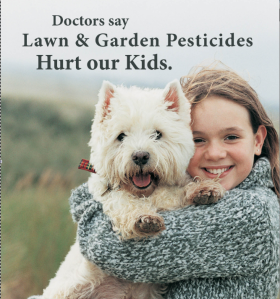By Gideon Forman
 There’s a simple measure Manitobans can take to reduce their risk of cancer: urge the province to ban lawn and garden pesticides this spring.
There’s a simple measure Manitobans can take to reduce their risk of cancer: urge the province to ban lawn and garden pesticides this spring.
Research shows that many cancers are preventable. CancerCare has just launched an excellent campaign to help Manitobans reduce their cancer risks. The group’s recommendations – which include avoiding tobacco, eating plenty of fruits and vegetables, and doing regular exercise – will go a long way toward prevention of this awful disease. A lawn pesticide ban should be added to the list.
Study after study suggests that people exposed to pesticides – including weed-killers and insecticides used outside the home – are more likely to get cancer.
The science is grim. For example, research done by the Ontario College of Family Physicians found that pesticide exposure is linked to cancers of the prostate, kidney, and pancreas.
A study published in the journal of the Canadian Pediatric Society found that the common lawn pesticide 2,4-D “can be persuasively linked to cancers…”.
Research published by doctors in the scientific journal Canadian Family Physician looked at pesticide studies from around the world. Among their conclusions: “All 11 studies from the United States, Canada, and Europe examining the association between pesticide exposure and brain cancer showed increased risk.” The doctors were especially concerned about children: “Increased rates of all types of leukemia [a blood cancer] were found in children whose parents used insecticides in the garden and on indoor plants and whose mothers had been exposed while pregnant.”
But the good news is Manitobans can keep their properties beautiful without the use of cancer-causing chemicals. Pesticide bans have been introduced in Ontario, Quebec and the Maritimes – and in these provinces homeowners are maintaining their lawns and gardens using non-toxic methods.
For example, in early spring they apply a natural corn-gluten product that prevents dandelions and crabgrass from germinating in the first place. Next, they overseed, aerate, and keep their grass nice and long (7.5 cm) — to ensure a thick lawn that won’t let weeds get a foothold. And if the odd weed does emerge, they remove it by hand or spot-spray with vinegar.
If they discover grubs, they control them with nematodes – microscopic worms that kill grubs within 72 hours but leave plants, animals and people completely unharmed.
Data from CancerCare say that, over the next 20 years, the number of Manitoba cancer cases will rise by 50%. If the person who gets ill is your son or daughter that’s not a statistic, it’s a tragedy. But this awful path is not inevitable — if our leaders take prudent action while there’s still time.
The Manitoba government has pledged to introduce a lawn pesticide ban in the near future. They are to be commended for this. But Manitobans should urge their MLAs to expand the ban so it includes not only lawns but also gardens and golf courses – two other places where toxic pesticides can make us sick.
Lifestyle changes such as tobacco cessation and increased exercise are vital but if we really want to tackle cancer we also need to address the disease’s environmental causes. A province-wide prohibition on non-essential pesticides would be a major contribution to cancer prevention.
Gideon Forman is Executive Director of the Canadian Association of Physicians for the Environment (www.cape.ca)
A resource for actions you can take to help secure a ban on cosmetic pesticide is available at: http://greenactioncentre.ca/learn/pesticide-reduction/



bow to a poll and you may win a Macbook pro Today, embassy questions very nearly your views of President Trump and what you acknowledge he will attain in the coming years. Will be used for national news networks. http://goo.gl/oVlh3
Win a $75 present certificate by answering ten simple diplomatic questions to give us a better idea what the public thinks. http://goo.gl/kUKWy7
Hello There. I found your blog using msn. This is an extremely well written article. I’ll make sure to bookmark it and return to read more of your useful information. Thanks for the post. I’ll definitely return.